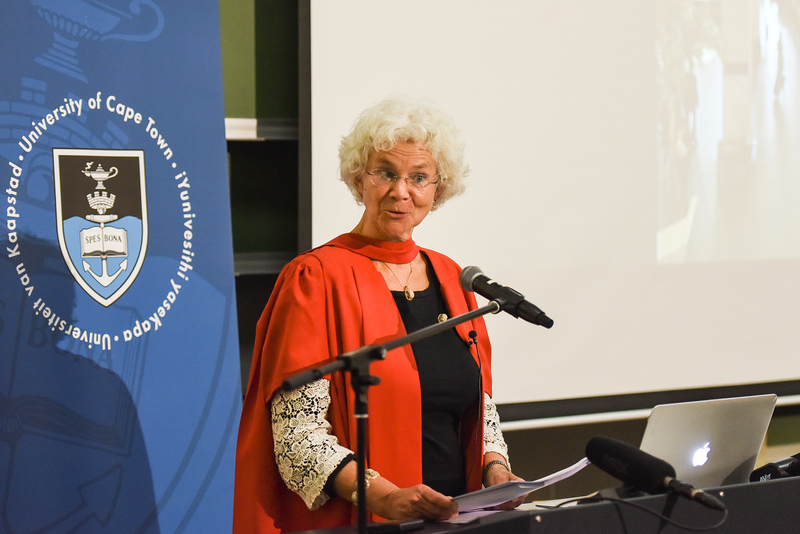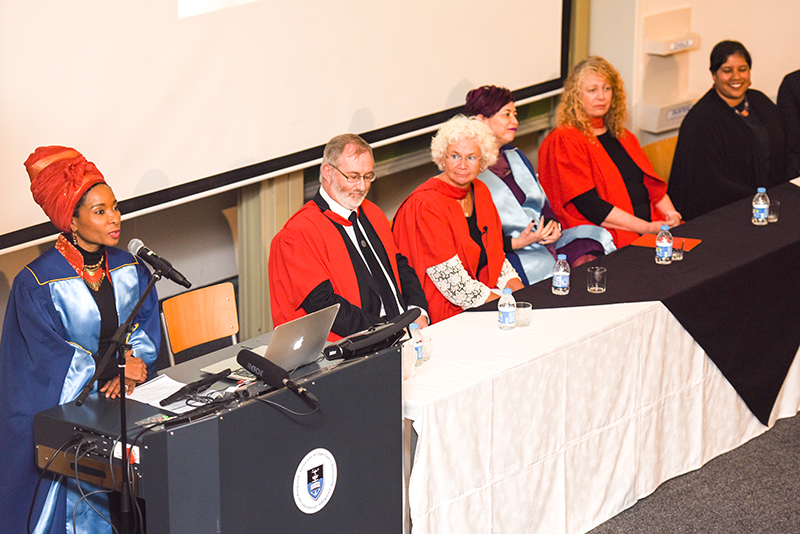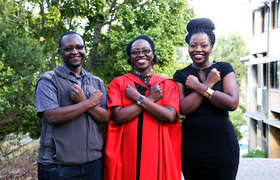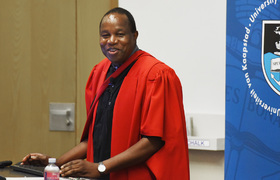Reconfiguring the human through the child
07 September 2018 | Story Helen Swingler. Photos Robyn Walker. Read time 7 min.
Existing education models tend to work merely to prepare children for adulthood, completely missing the opportunity to take advantage of their natural talents such as artistic expression, learning a new language, or the ability to ask philosophical questions.
That was the view expressed by University of Cape Town (UCT) Professor Karin Murris, a specialist in the field of pedagogy and philosophy in the School of Education, during her inaugural lecture on 5 September.
Titled “Posthuman Child: Reconfiguring the human and educational relationality in all phases of education”, her lecture is part of the Vice-Chancellor’s Inaugural Lecture Series. These are public lectures that celebrate candidates’ appointment to full professorship, at which they present the research that has been the focus of their career.
Murris is an internationally recognised scholar in education, and currently principal investigator of a National Research Foundation-funded project, “Decolonising Early Childhood Discourses: Critical posthumanism in higher education”.
Transforming the child
Illuminating the theme of Murris’s lecture in her welcome, Vice-Chancellor Professor Mamokgethi Phakeng raised the concern that higher education has, since the demise of apartheid, been more concerned with gender and class than with age.
“In particular, child and childhood has not been included in postcolonial discourses about transformation of the higher education spaces and curriculum, despite critique and contestation in early childhood development research,” she said.

Murris’s own journey to academia had been anything but conventional, acting Dean of Humanities Professor David Wardle said his introduction.
“She secured her first full-time position in academe at the age of 50, as a senior lecturer in education at Wits in 2009. In 2012 she came to UCT as associate professor in the School of Education, and in 2016 she was promoted to full professor.”
“Child and childhood has not been included in postcolonial discourses about transformation of the higher education spaces and curriculum, despite critique and contestation in early childhood development research.”
Murris presented her lecture in two parts, the first via an animated cartoon by Brandan Reynolds, which she narrated, and the second through colleagues who presented their own published research and experiences.
As a preface to the lecture, Murris showed footage of Dutch designer Maarten Baas’s Real Time series artwork, a large performance art clock in Schiphol Airport in Amsterdam. This reflected the chronos-based, Western concept of sequential human development that was central to her theme.
“It’s the time of capitalism, colonialism and militarism,” she said. “It’s also the time of schooling that prepares children for a neoliberal, individually competitive workplace.”
Children’s development is determined by the rigid frameworks of units of chronological time, “an uninterrupted flow of ‘nows’ that can be measured”, she added later.
Time and childhood are “intrinsically entangled concepts, and logically connected in the lived experience of educational institutions”.
Linear maturation
“The ‘norm’ of the child’s linear maturation process is an adult who is white, middle class, male, heterosexual and able-bodied – the root cause of structural exploitation. Age has not yet been included as a category of discrimination,” Murris warned.
“Even the child rights discourse is developmental. The United Nations Convention on the Rights of the Child assumes that the end goal of childhood is the formation of an adult citizen, competent and capable of living individually and contributing productively to Western-style liberal democracy.
“The adult with the capital ‘I’ is the accepted norm, and the child therefore is the lesser, still maturing adult-in-the-making – the child with the small ‘i’ – childish, less competent and less useful.”
Society thus treats children as intellectual and emotional primitives, who need to be developed from “savage to civilised”.
“The child is an ontological other; the child is marginalised, the property of the adult, economically disenfranchised with no right to work or own property, a description that also applied to indigenous peoples. As Cecil Rhodes put it darkly: ‘The native is to be treated as a child’.”
This expresses not only racism but a colonial view that eschews the notion that the child has the capacity for choice and moral agency.
Instead, as part of their civilisation, children are corralled into institutions.
“Like the insane and the criminal, the child is confined in institutions, suffers from mental humiliation, harsh punishment, constant surveillance and a complete lack of academic freedom.”
“Like the insane and the criminal, the child is confined in institutions, suffers from mental humiliation, harsh punishment, constant surveillance and a complete lack of academic freedom,” Murris said.
Deficit model of development
Developmental models also assume a deficit model of childhood, the plausibility of which rests on comparing children with adults primarily in terms of adult knowledge.
“Moreover, [the] child is not only separate and segregated from adults spatially, forced into indoor classrooms to learn and interact, and in recreational areas to play and [be] socialised, that child is also separated from her own self. Cut into emotional, cognitive and physical parts, children develop each part according to different speeds.
“Current models of education also assume a universal, timeless knowledge of the outside world, obtained from the inside of the mature, knowing adult subject as conscious, self-aware, independent, self-contained, rational, mature and universal.”
The result is predictable, according to Murris - autonomous units that are centrally controlled.
“Since modernity, academic work in schools and universities is carried out by disembodied brains on sticks. Knowledge is transmitted through language, through words that represent the world ‘out there’. Learning is about the world and it is seldom experiential, involving the body and the senses.”
The preferred method of teaching is inculcation; in Latin “forced upon or stamped in”. Work sheets are a good example of this.
“Touching, smelling or movement are rarely regarded [as a means] to acquire, to communicate or assess knowledge that matters.”
“Touching, smelling or movement are rarely regarded [as a means] to acquire, to communicate or assess knowledge that matters,” she said.
Scientifically objectified as units of study, children (though not yet fully humanised) are also subjected to a sea of normative classifications and semi-medical diagnoses when they depart from the known.
“Think of ADHD, autism, and bipolar.”
Decolonising teacher education
In the second part of her lecture, Murris invited colleagues Rose-Anne Reynolds and Joanne Peers to demonstrate some implications for decolonising teacher education. Murris said that, as educators, they had “stirred up trouble” in and outside their university classroom. They provoked their students to “make kin” with children, each other, other animals, “learning to be present in the colonised spaces”.
The aim, she explained, was to offer “an imaginary of the possibilities when education shifts radically to embrace a relational ontology, creating different epistemic and ethical relationships to time, space, truth and matter in teaching, by troubling the boundaries between adult/child, nature/culture and past/present/future”.
 This work is licensed under a Creative Commons Attribution-NoDerivatives 4.0 International License.
This work is licensed under a Creative Commons Attribution-NoDerivatives 4.0 International License.
Please view the republishing articles page for more information.










